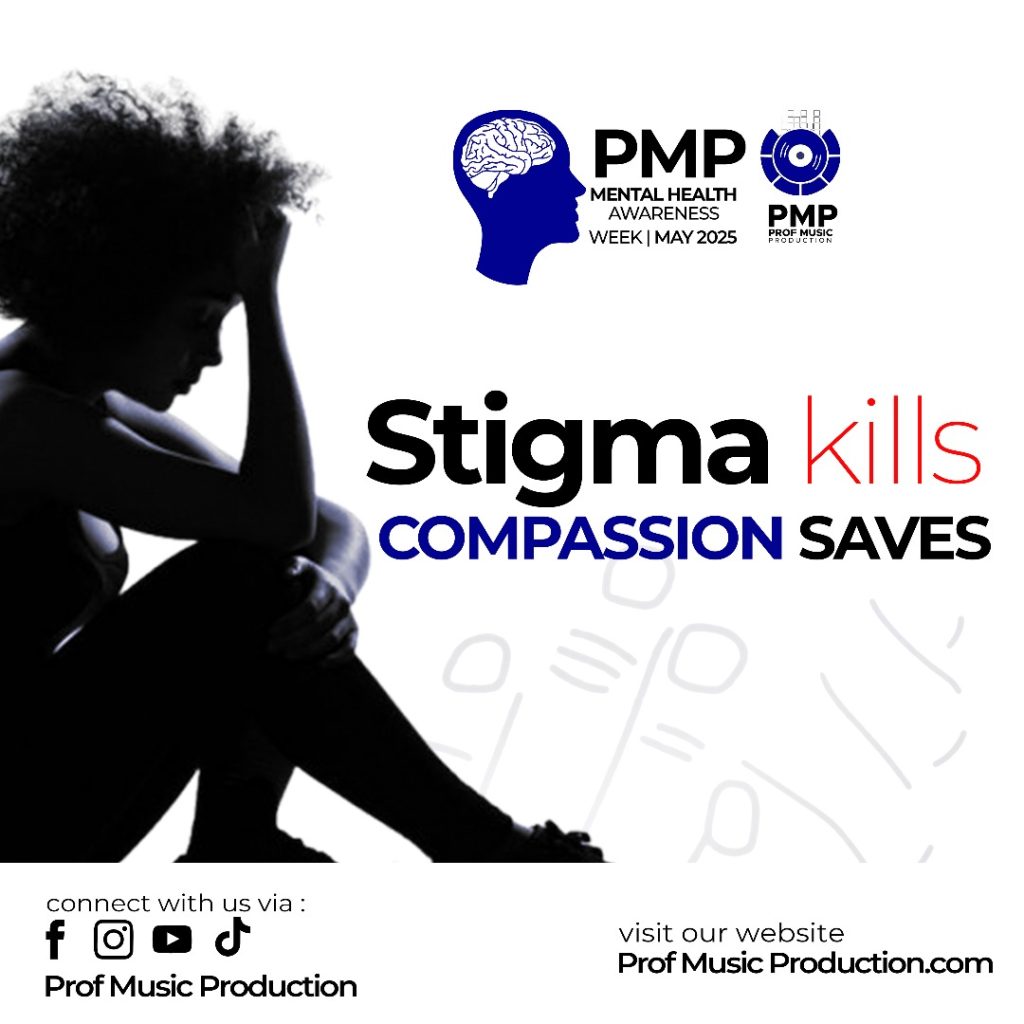Mental Health Awareness Month in May is more than just a global observance—it’s a call to action. In Ghana’s vibrant choral music community, where voices blend to create beauty, there exists an often-unspoken battle: mental health struggles.
Prof Music Production (PMP), a choral live sound engineering firm, is committed to breaking the silence and tackling the stigma head-on.
The Silent Struggles of Choir Members
Choral musicians, like all artists, face immense pressure. From demanding rehearsals to high-stakes performances, they are expected to exude confidence and emotional depth. But behind the
harmonies, many endure challenges such as anxiety, performance-related stress, and depression.
Research highlights that creative professionals globally are at a higher risk for mental health struggles (Kenny et al., 2014).
In Ghana, where mental health is still stigmatized, many choir members suffer in silence. According to the World Health Organization (WHO), about 13% of Ghana’s population experiences mental health disorders, yet only a fraction seek help due to societal misconceptions and inadequate resources (WHO, 2017). This silence is especially pronounced in religious and artistic communities, where vulnerability is often mistaken for weakness.
What Fuels Mental Health Issues in Choirs?
Mental health challenges in choirs stem from multiple sources:
Internal
- Performance Anxiety: Fear of making mistakes or facing criticism can be overwhelming.
- Leadership & Management Styles: Choir members thrive in a supportive environment, but harsh leadership can break confidence.
- Social Exclusion & Cliques: Gossip, favouritism, and unresolved conflicts contribute to feelings of isolation.
- Exhaustion from Overcommitment: Choir members juggle demanding rehearsal schedules alongside personal responsibilities, leading to burnout.
External
- External Stress: Many choir members balance music with academic, professional, and personal challenges.
- Cultural and Religious Beliefs: Some believe mental struggles stem from spiritual weakness rather than psychological conditions, discouraging open discussions.
- Limited Mental Health Awareness: Many choirs lack access to trained counsellors, safe spaces, or knowledge on emotional well-being.
Understanding Stigma in Choirs
Choirs are meant to be places of unity, yet stigma creates divisions. When a member withdraws due to stress, they’re often labelled as “lazy” or “unserious” instead of being asked, “Are you okay?” The pressure to be perfect forces many to suppress their struggles for fear of losing key roles such as solos or facing judgment.
Additionally, Ghanaian culture often equates emotional distress with spiritual battles, discouraging medical intervention. Choir members may hesitate to speak out, fearing gossip, exclusion, or being perceived as weak. This culture of silence can be deadly.
Prof Music Production’s Approach to Change
At PMP, we recognize that sound engineering isn’t just about technical excellence—it’s about supporting the voices that make music meaningful. That’s why we are committed to advocating for mental health awareness in choral music.
Our Recommendations for Choirs
- Encourage Open Conversations: Let mental health be a normal topic in choir meetings, encouraging members to speak up. Assumption kills!
- Recognize Signs of Struggle: Leaders and members should be trained to identify anxiety and depression in peers.
- Promote Mental Health Resources: Direct members to counselling services and support networks available in Ghana.
- Reduce Stigma: Emphasize that mental health challenges are common and treatable.
- Implement Team Bonding Initiatives: Organize break-out trips and activities to strengthen choir unity.
- Create a Safe and Supportive Environment: Address conflicts quickly and eliminate toxic choir culture such as rumour peddling.
- Practice Stress Reduction Techniques: Encourage breathing exercises, mindful rehearsals, and structured rest periods.
- Prioritize Realistic Expectations: Choir leaders should know the strengths and limitations of their team to prevent burnout.
Stigma Kills, Compassion Saves
Choirs are more than music—they are communities. When stigma is allowed to grow, it damages not only individuals but the collective harmony of the choir itself. But with compassion, understanding, and action, change is possible.
Prof Music Production urges every choir leader, musician, and community member to speak up and support mental health initiatives. Because when we nurture the minds behind the music, we amplify the power of voices, both on and off the stage.
References
- Ghana Mental Health Authority: https://ghanamentalhealthauthority.org
- ·Kenny, D. T., et al. (2014). The Psychology of Music Performance Anxiety. Oxford University Press.
- World Health Organization (2017). Mental Health in Ghana: WHO Update.
https://www.who.int/ghana/news/detail/16-10-2017-mental-health-in-ghana
If you’ve ever felt unseen behind the music, share your story. You’re not alone. Anonymity is assured.


Thanks alot for the insight
It’s hard time choiresters look into this topic very well
Thanks alot